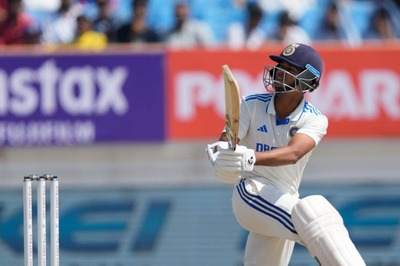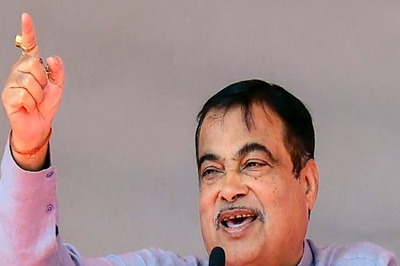
views
Cairo: The leadership of Egypt's ruling party quit on Saturday, but the protesters who have rocked the political establishment dismissed the move as a ruse that would not deter them from their goal of toppling the president.
The United States, Egypt's key ally, which has been demanding transition begin immediately, signalled it might be changing tack by declaring explicitly that President Hosni Mubarak should stay in power to oversee the process. This was likely to anger demonstrators demanding he resign immediately.
Reports by Al Arabiya saying President Hosni Mubarak had resigned as head of the party were later withdrawn by the Dubai-based television news channel.
Mubarak has reshuffled his government but says he intends to stay on as president until elections in September.
State television said only the leadership of the party, including Mubarak's son Gamal, had resigned and named the new secretary general as Hossam Badrawi, seen as more liberal.
A US official called the resignations a positive step, but said the administration looked forward to "additional steps".
But the protesters were not impressed by the latest gesture.
"These are not gains for the protesters, this is a trick by the regime. This is not fulfilling our demands. These are red herrings," said Bilal Fathi, 22.
Leading Muslim Brotherhood member Mohammed Habib said: "It's an attempt to improve the image of the party but it does not dispense with the real aim of the revolution: bringing down the regime, starting with the resignation of President Mubarak."
"It is an attempt to choke the revolution and gain time."
Earlier Mubarak met some of the new ministers, the state news agency said, in a clear rebuff to the hundreds of thousands of anti-government protesters who rallied at Tahrir Square in central Cairo for a 12th day.
"The status quo is simply not sustainable," US Secretary of State Hillary Clinton told a security conference in Munich, referring to the situation in Egypt and the wider Middle East.
US special envoy for Egypt Frank Wisner, after demands said Mubarak "must stay in office to steer those changes".
Saboteurs blew up a gas pipeline in northern Egypt overnight, disrupting flows to Israel and also to Jordan, where protesters angered by economic hardship have been demanding a more democratic political system.
Negotiations
Vice President Omar Suleiman began meeting prominent independent and mainstream opposition figures, state television said, to try to work out how to ensure free and fair future presidential elections while sticking to the constitution.
But with some of the protesters insisting they wanted not just Mubarak but also his allies out straight away, it was unclear even that would be enough to end the crisis.
An Egyptian army commander was shouted down when he tried to persuade thousands of demonstrators at Tahrir Square to stop a protest that has stalled economic life in the capital.
"You all have the right to express yourselves but please save what is left of Egypt. Look around you," Hassan al-Roweny said through a loud speaker and standing on a podium.
The crowd responded with shouts that Mubarak should resign. Roweny then left, saying: "I will not speak amid such chants."
Western governments have expressed support for the protesters but were cautious about expecting too much too fast.
"President Mubarak has announced he will not stand for re-election nor will his son ... He has given a clear message to his government to lead and support this process of transition," Clinton told a security conference in Munich where world leaders will discuss how to proceed.
"That is what the government has said it is trying to do, that is what we are supporting, and hope to see it move as orderly but as expeditiously as possible under the circumstances," she said.
Mubarak said on Thursday that Egypt would descend into chaos if he gave in to protesters' demands and quit immediately.
He has styled himself as a bulwark against Islamist militancy and essential to maintaining a peace treaty Egypt signed with Israel in 1979.
No Easy Compromise
The United Nations estimates 300 people have died in the unrest and the health minister has said around 5,000 people have been wounded since January 25, while a Credit Agricole report said the crisis was costing Egypt about $310 million a day.
With the unrest crippling the economy in the Arab world's most populous nation, some Egyptians want a return to normal.
But a bourse official said on Saturday the stock market would not reopen on Monday as originally planned, without giving a new date. Banks were due to reopen on Sunday.
Mubarak met the prime minister, the finance minister, the oil minister, the trade and industry minister and the central bank governor on Saturday, the state news agency said.
In Tahrir Square, protesters occupying the usually busy intersection in the heart of the city said they were not giving up, despite continuing tensions with Mubarak loyalists who attacked them earlier in the week.
"We are not leaving the square until our demands are met," one of them shouted over a loudspeaker, after a relatively peaceful night where some sang patriotic songs and chanted poetry over loudspeakers talking of victory over Mubarak.
Some ordinary Egyptians outside the protest area shouted profanities at those heading to the square in frustration at the collapse in law and order in some areas. Fights erupted now and then between protesters and people wanting them to go home.
The unprecedented challenge to Mubarak has rallied many different strands of society -- professionals and the poor, secular and religious, Muslims and Christians, internet-savvy youth with members of the Muslim Brotherhood Islamist movement.




















Comments
0 comment